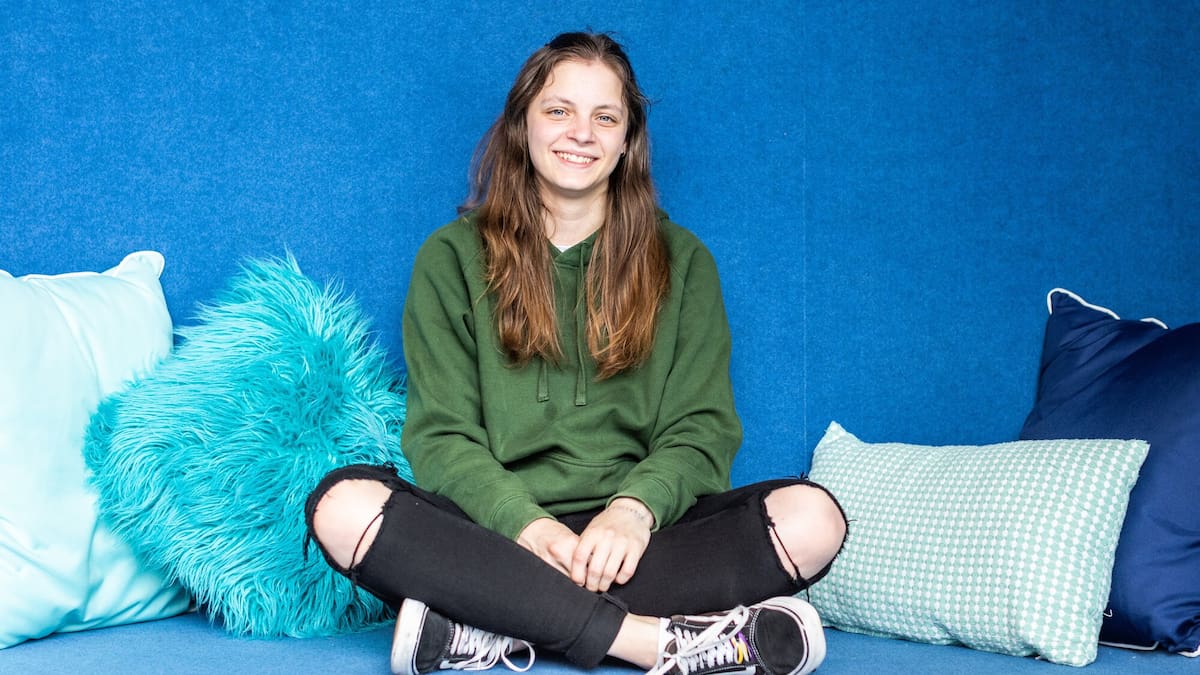They’ve previously written books I Am Autistic and This Is ADHD – and it’s thanks to their publishers, Allen & Unwin Aotearoa New Zealand, that Moriah was diagnosed with dyslexia in the first place.
“They floated the idea of a dyslexia book, and I was like, ‘Oh, I’m pretty sure I’m dyslexic anyway’, and so from there I decided to go and get an assessment.”
For Moriah, what’s day-to-day life like with dyslexia?
“I can’t, for the life of me, read stuff out loud. The words won’t come out right. I stutter, I can’t read it, I read them in the wrong order. And when I do read, I can’t process what I’ve read. It’s like reading a foreign language. I can say it, I can read it, but I don’t actually know what it means, and so that’s made reading very difficult.
“I got through all of high school without reading a single book. I avoid reading a lot.”
Moriah says it can take a long time to learn new words.
“When I do, I often learn them incorrectly, just trying to judge based on the context in which it’s used.”
However, they say there are positives to having dyslexia.
“It does mean I’m quite good at problem-solving and finding my way around different things, finding alternative ways to learn information or do my job. It does make me quite creative. I like those parts of it.”
Moriah drew on their own experiences, advice from an educational psychologist, and conversations with people with dyslexia and their family members to write and illustrate the book.
Chanelle Moriah hopes their newest book I Am Dyslexic can help Kiwis understand dyslexia better. Photo / Judah Plester
They say of the three they’ve published, this book was ”honestly the hardest” they’ve written because of the lack of information available about dyslexia, adding the only reason they could find information was because they knew what to look for.
“A lot of it was based on conversations or my own experience or breaking down each trait and thinking about it quite logically and how that’s going to impact you – and then from there, seeing if there was information that backed up how I had processed it.”
Moriah says there aren’t many resources available to those with dyslexia, particularly in workplaces.
“In the employment space, there’s definitely this attitude of ‘you manage it yourself’. There’s not really a lot of accommodation around it, not a lot of understanding.
“People will see someone who’s dyslexic and they’ll go, ‘Oh, well, you can’t do this job because you can’t read, and it’s your problem to manage that’.
“It’s not one that there’s a lot of support for, which I hoped I could talk about a bit with this book and talk about ways that people might accommodate it, because I understand that if you don’t really understand what dyslexia is, it’s hard to see how you might accommodate someone who is dyslexic.”
I Am Dyslexic is Wellington writer Chanelle Moriah’s third book. Photo / Allen & Unwin New Zealand
Moriah also works at Autism New Zealand as a research and advocacy advisor.
“In my position, there are two of us in the same role, and my co-worker does the parts that involve lots of reading, and I do the parts that don’t… we’ve kind of divided the tasks in a way that suits our strengths, but in any other setting, I would not be able to do this job.”
There are many misconceptions about what dyslexia actually is, Moriah says.
“People see it as you can’t read, or the words get mixed up on a page, or you can’t learn. I’ve had conversations where people are under the impression that you have to improve your dyslexia to be able to learn things.
“And I’ve said to them, ‘Well, no, I will always be dyslexic. I will always struggle with reading. I find other ways to learn it. Just because I can’t learn it that way, doesn’t mean I can’t learn it another way.”
Now, Moriah hopes this book will help change that perception.
The book explains the many different ways dyslexia can present and is designed like a journal, with space to draw or write down your thoughts in response.
Moriah has tried to make it accessible for dyslexic people. There are boxes where you can write and draw, which breaks up the text and allows readers to process the information in whatever way works best for them.
“Like my other books, it’s designed to be personalised because everyone’s experience with each condition is going to be so different. I can’t write one book that describes everyone.
“I fully recognise the irony of the situation where dyslexic people are probably not going to read the book,” Moriah adds with a laugh.
“I guess my hope was more that those who do read it, who are maybe not dyslexic, gain a bit of understanding of it and how to then implement some different strategies around people who are dyslexic.
“And if people who are dyslexic happen to manage to read my book, they might learn a thing or two about how to help themselves.”
Bethany Reitsma is a lifestyle writer who has been with the NZ Herald since 2019. She specialises in all things health and wellbeing and is passionate about telling Kiwis’ real-life stories.

